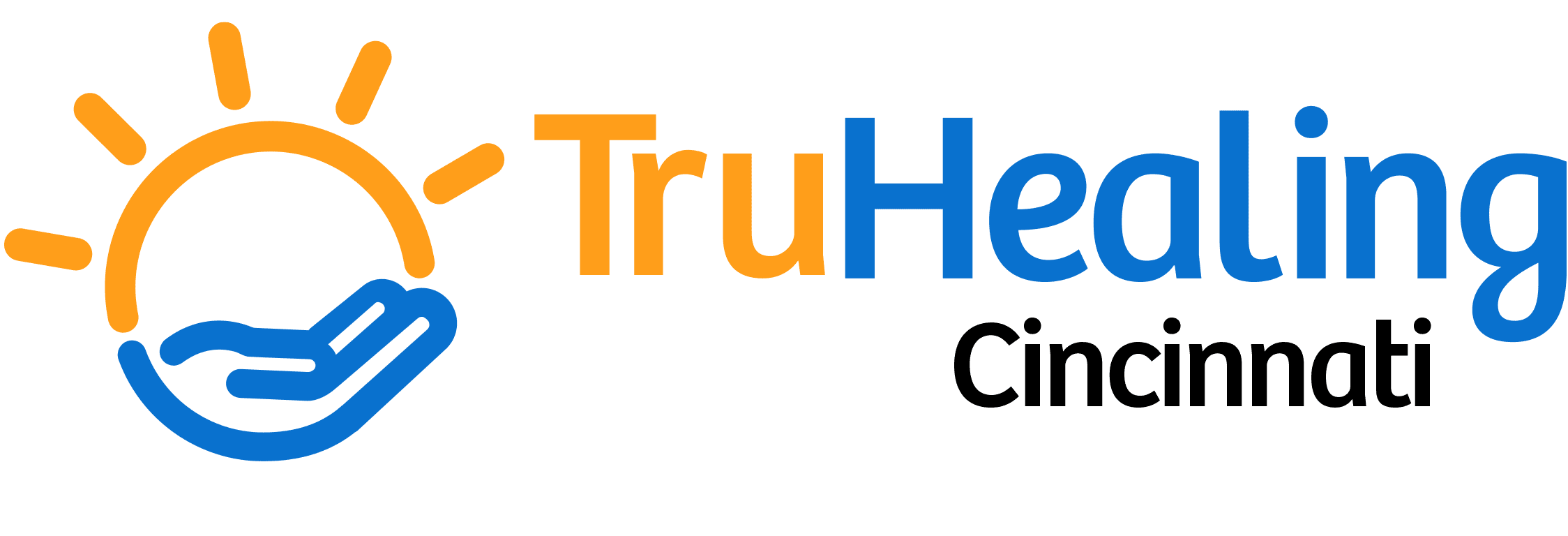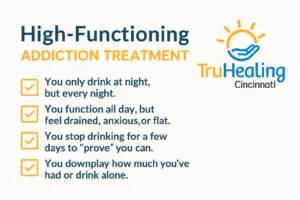You show up.
You get things done. You reply to emails. You take care of your responsibilities. You hit deadlines. You’re the one people rely on.
But you’re also the one who drinks alone after the kids are asleep. The one who pours a second glass and tells yourself it’s just “a little something to unwind.” The one who jokes about drinking too much so people don’t ask if you’re serious.
You keep it together on the outside. But functioning isn’t the same as thriving.
At TruHealing Cincinnati, we work with high-functioning people every day—professionals, parents, partners—who haven’t hit “rock bottom” but know something’s not right. If you’ve been wondering whether it’s time to take a closer look at your drinking, this blog is for you.
High-Functioning Doesn’t Mean Unaffected
There’s a myth that addiction only counts if you’re visibly falling apart. But alcohol use can erode your life from the inside out—slowly, quietly, and with very few external cracks.
You might relate to any of these:
- You only drink at night—but every night.
- You stop for a few days just to “prove” you can.
- You’ve Googled, “Do I have a drinking problem?” more than once.
- You function all day, but feel flat, anxious, or emotionally checked out.
- You have rules: never before 5pm, only at home, only wine. But the rules keep shifting.
- You wake up exhausted and can’t remember what you watched last night.
- You hide your recycling or downplay how much you’ve had.
The problem isn’t always how much you drink. It’s what drinking is covering—and what it’s costing you.
The Hidden Cost of High-Functioning Alcohol Use
Alcohol may help you:
- Sleep
- Socialize
- Slow your thoughts
- Manage anxiety
- Shut down the part of you that’s always “on”
But it also dulls your ability to fully engage, connect, and feel present.
One client told us:
“I wasn’t out of control. I just wasn’t myself anymore. I was tired of living on autopilot.”
That’s the cost of hidden alcohol use—not collapse, but disconnection.
You may still have your job, your family, your routines. But do you have peace? Clarity? Joy? When alcohol becomes the only reliable way to relax or feel okay, it’s worth asking: What would life feel like without this crutch?
What Alcohol Addiction Treatment Looks Like for High-Functioning Adults
You don’t need a dramatic intervention to explore treatment. You don’t even need to be sure you want to stop drinking forever.
At TruHealing Cincinnati, we offer care that’s designed for people who are functioning—but feeling off. Here’s what that looks like:
1. Flexible Outpatient Support
We offer intensive outpatient (IOP) and standard outpatient programming that fits around your work, parenting, and life responsibilities.
2. Mental Health Integration
Many high-functioning clients are quietly struggling with anxiety, perfectionism, or unresolved trauma. We treat the emotional root—not just the behavior.
3. Personalized Care Plans
We don’t assume your story. We ask what you need: moderation, abstinence, medication support, trauma therapy, or all of the above.
4. Respect for Privacy
Discretion and dignity matter. You’re not on display. You’re not being judged. You’re being supported by professionals who’ve seen it all.
5. Peer Connection Without Pressure
You’ll meet others who get it. Some who are successful on the outside. Some who’ve never been to treatment before. Group isn’t about confessing. It’s about connecting.
Signs It’s Time to Talk to Someone
It’s easy to second-guess yourself when nothing has “fallen apart.” But many of our clients say they wish they’d reached out sooner—before the burnout, before the hiding, before the spiral.
Ask yourself:
- Do I use alcohol to change how I feel—even temporarily?
- Do I worry about how much I drink, even if I don’t show it?
- Do I feel more like myself before I start drinking… or after?
- Is drinking making my life smaller, not bigger?
If the answers leave you feeling uneasy, it might be time for a conversation.
What If You’re Not Sure You’re “Addicted”?
You don’t have to be.
Our job isn’t to label you—it’s to help you understand your relationship with alcohol and what you want to change. Some people explore moderation. Others discover that sobriety feels more freeing than they imagined.
You’re not locked into anything. But giving yourself space to explore can shift everything.
One client shared:
“I didn’t even know how much space alcohol was taking up in my life until I got a break from it. Then it was like, ‘Oh—this is what calm feels like.’”
What Recovery Looks Like Without the Drama
You don’t need a rock bottom moment to begin. You don’t need to lose everything. You just need one clear truth:
“I want to feel better than this.”
Recovery might look like:
- Sleeping through the night without a drink
- Feeling sharp during your morning meetings
- Laughing without needing wine to loosen up
- Going out and not worrying if you’re “overdoing it”
- Coming home clear-headed
- Not hiding bottles or avoiding questions
- Feeling proud of yourself again
It doesn’t have to be a total life makeover. Just a return to yourself.
FAQs: For the High-Functioning, Quietly Concerned
How do I know if I really need treatment?
You don’t need to wait for a crisis. If your drinking feels more like a coping mechanism than a choice—and it’s starting to wear on you—treatment can help you regain clarity, even if everything looks “fine” on the outside.
Can I keep working while in treatment?
Yes. We offer outpatient programs with flexible scheduling. Many of our clients continue working or caring for family while participating in treatment.
Do I have to stop drinking completely?
Not necessarily. We’ll help you explore your goals, understand what’s driving your use, and support whatever recovery plan aligns with your values and needs.
Will I be in group with people who are very different from me?
Our groups are thoughtfully built. You’ll meet others with different stories—but many shared feelings. We create safe spaces where everyone feels respected, not singled out.
What if I’ve never done treatment before?
That’s okay. Many of our high-functioning clients are new to this process. We’ll guide you step by step—no pressure, no shame.
Is it confidential?
Absolutely. Your care, participation, and treatment are completely confidential and protected by law.
Ready to Go from Surviving to Living?
Call (888) 643-9118 or visit our Alcohol Addiction Treatment page to learn how TruHealing Cincinnati can support your next chapter—one where functioning isn’t the finish line, and healing is within reach. If you’re in Lawrenceburg, Lexington, Springfield, or Louisville, TruHealing offers programs with that same trusted approach.


